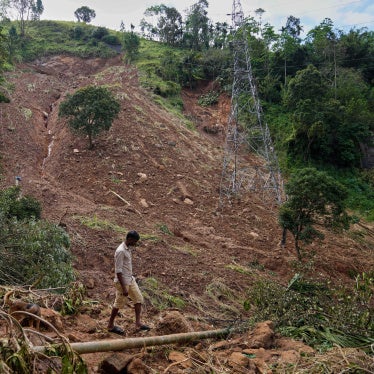For probably the first time, Bangladesh’s government has leveled pollution-related fines against two leather tanneries in Hazaribagh, a Dhaka neighborhood so polluted with waste from its roughly 150 tanneries that residents and workers are plagued by serious health problems.
This announcement came four months after Human Rights Watch released a report revealing the extent of workers’ and residents’ broken-down health, ranging from painful skin diseases to respiratory illnesses. Shortly before our report launch, a senior official in Bangladesh’s Environment Department told Human Rights Watch, “There is no monitoring and no enforcement in Hazaribagh.”
The two tanneries were fined for not having effluent treatment plants, which would treat their chemical-laced wastewater.
Each day, the area’s tanneries discharge some 21,000 cubic meters of untreated waste containing chromium, lead, and other chemicals and heavy metals into the nearby Buriganga River. The air reeks of chemicals, which have harmed the area’s water and soil and the health of people living nearby. Hazaribagh is home to between 90 and 95 percent of all Bangladesh’s tanneries, and they employ between 8,000 and 12,000 people.
“Living beside the tanneries is difficult, all the dirty water comes here, the fumes are very bad,” said Goyenda, who is in her late teens and has lived in Hazaribagh for just over a year. “I have problems with my eyes. They water a lot and become red. The tannery gas causes this.”
She also suffers from fevers, stomach aches and headaches. “I never had the problem before coming to this slum,” she said.
Others complain of skin diseases and respiratory problems, or fret about the pollution.
“You get a smell from the [public] supply water,” said Ashor, a married man in his mid-50s with four children. “I am worried about the supply water. I don’t know whether it is safe or not. The corrugated tin [used for walls] corrodes in six months. This also worries me. I want to know more but I’ve never been given any information about the water, air, and soil.”
The tanneries are a major money-maker for Bangladesh. From June 2011 to July 2012, Bangladesh’s tanneries exported close to $663 million in leather and leather goods—like shoes and handbags—to some 70 countries worldwide, including Italy, Germany, Spain, China, and the United States.
The fines, handed down by the Department of Environment, came to $50,000 for the Bay Tanneries and $25,000 for the Ayub Brothers tannery. It is not clear why these two tanneries were singled out.
As follow-up to the Toxic Tanneries report, Human Rights Watch has pressed the international leather industry to identify and mitigate the human rights risks from the tanneries in Hazaribagh. Two weeks ago, Human Rights Watch called on buyers at a flagship international leather fair in Bologna to buy leather goods only from Bangladesh tanneries that respect environmental standards and comply with laws that protect the right to health and labor rights.







